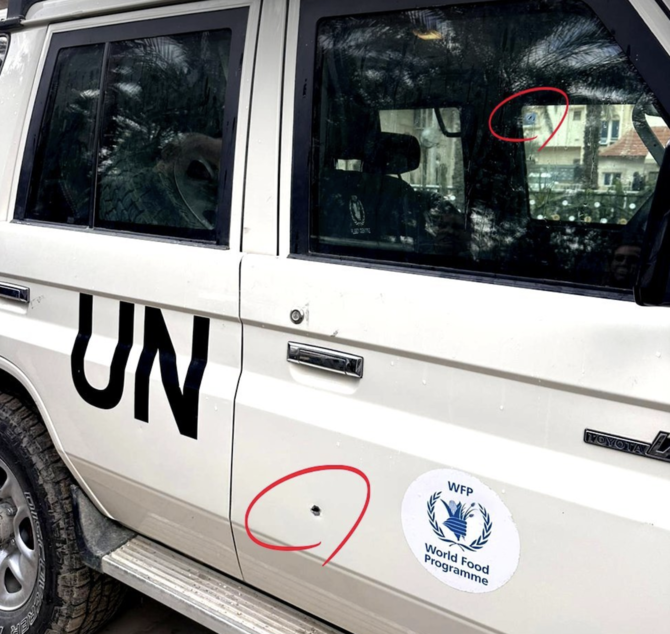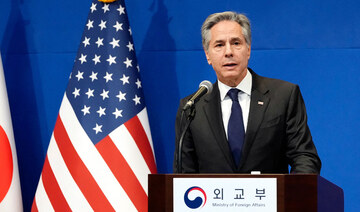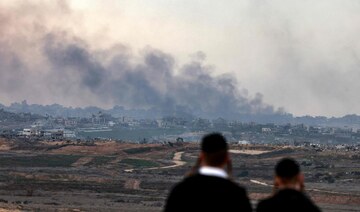BEIRUT: Lebanese army convoys entered the coastal city of Naqoura on Monday to be redeployed and repositioned following the withdrawal of Israeli forces that had invaded the area during last year’s war.
The redeployment came as the quintet committee tasked with implementing the ceasefire agreement held a meeting in Ras Al-Naqoura, which US envoy Amos Hochstein attended for the first time.
Lebanese army vehicles have gathered in the south of Tyre in preparation for their entry to Naqoura after the army’s bulldozers carried out sweeping operations in the area for the past two days following the Israeli army’s withdrawal.

A security source said that the army was expected to reposition itself in the sites it had evacuated before the Israeli invasion last year.
A US military representative, a French military representative and military members representing Lebanon, Israel and UNIFIL were present at the quintet committee’s meeting.
The committee met amid increasing Lebanese and UNIFIL complaints about Israeli violations of the ceasefire agreement.
FASTFACT
US envoy Amos Hochstein held talks with Lebanese Army Commander Gen. Joseph Aoun before the quintet committee’s session, followed by meetings with Parliament Speaker Nabih Berri and Prime Minister Najib Mikati.
A significant Israeli violation took place last Saturday.
UNIFIL said in a statement: “The peacekeepers observed an Israeli army bulldozer destroying a blue barrel marking the line of withdrawal between Lebanon and Israel in Labbouneh, as well as an observation tower belonging to the Lebanese armed forces immediately beside a UNIFIL position.”
The peacekeeping force described the move as “deliberate and direct destruction of both clearly identifiable UNIFIL property and infrastructure belonging to the Lebanese armed forces, which is a flagrant violation of Resolution 1701 and international law.”
Earlier, Israeli bulldozers uprooted a Lebanese army observation tower 10 meters from where the quintet committee’s meeting would later take place at UNIFIL headquarters.
Hochstein, who helped draft the ceasefire agreement between the Israeli army and Hezbollah, arrived on Tuesday morning at Beirut’s Rafic Hariri International Airport.
He held talks with Lebanese Army Commander Gen. Joseph Aoun before the quintet committee’s session, followed by meetings with Parliament Speaker Nabih Berri and Caretaker Prime Minister Najib Mikati.
Meanwhile, a patrol from UNIFIL removed the earthen barrier that Israeli forces had set up on Sunday at the southern entrance of the town of Burj Al-Muluk.
In the morning, Israeli forces demolished several houses in Naqoura before the scheduled deployment of the Lebanese army.
UNIFIL forces activated their alarm sirens in two phases, at level three and level two, from their headquarters in Naqoura.
The Israeli army demolished several houses in the town of Al-Jabin, located in the Tyre district.
The home of Lebanese Army Brig. Gen. Abbas Hassan Aqil was destroyed in the operation.
Israeli violations during the past 48 hours included combing operations in the towns of Maroun Al-Ras and Aitaroun in the Bint Jbeil district, using heavy machine guns, and blowing up houses in Aitaroun.
An Israeli force penetrated Taybeh, carried out a combing operation, and blew up several houses inside the town.
Lebanese Army Command said: “In light of the violations by Israel of the ceasefire agreement and its assaults on Lebanon’s sovereignty and its citizens, hostile forces infiltrated the area of Taybeh–Marjeyoun on Sunday.
“They proceeded to block three roads with earthen barriers.
“Subsequently, a patrol from the army was dispatched to the incursion site to monitor the situation in coordination with the five-member committee overseeing the ceasefire agreement, and the roads were reopened.
Israel also fired shells at homes in Bint Jbeil, Wadi Al-Hujayr, Markaba, Mays Al-Jabal and Burj Al-Muluk.
On Monday, civil defense personnel recovered the bodies of seven Hezbollah fighters who had died in previous confrontations with Israel in the town of Khiam.
Some bodies in southern border villages have yet to be retrieved due to the Israeli incursion, despite 41 days passing since the ceasefire was reached.
Meanwhile, statements by Hezbollah officials asserting that the party has not been defeated provoked local reactions.
Hezbollah’s Liaison and Coordination Unit official Wafiq Safa said from Beirut that the party “has not been defeated and will not be defeated. It is stronger than iron, and there will be no possibility for anyone to break our morale.”
Hezbollah’s Secretary-General Sheikh Naim Qassem said: “Our patience with Israel's violations is linked to the appropriate time to confront the enemy.
“It can run out before or after the 60-day deadline. When we decide to do something, you will directly see it.”
The statements sparked a series of responses.
Former President Michel Sleiman said: “This is a Hezbollah official imposing a security veto against the state carrying out its responsibilities.
“May God have mercy on those who lost their lives, houses and livelihoods due to unilateral war decisions. A futile support war that had catastrophic consequences.”
The Tajadod (Renewal) parliamentary bloc said: “The positions expressed by Wafiq Safa confirm that Hezbollah is trying to cover up its losses, surrender, suicidal choices and continued disruption of the constitution and institutions.
“It would have been better for Hezbollah, following the disastrous war it caused, to learn and return to its Lebanese identity just like any other component in the country. However, it insists on its behavior that contradicts the meaning of Lebanon as a diverse and open country and the concept of the state and its institutions. Enough is enough. The era of terrorizing the Lebanese people is over.”
MP Sethrida Geagea addressed Safa, saying: “Wafik Safa, look at yourself. Feel your hands. You know very well what you have committed against your people and the Lebanese. A final phrase to summarize your situation: People with any sense of shame are a thing of the past.”
MP Michel Daher said: “Should not Wafik Safa ask about who will take in the displaced again if war is renewed, God forbid? We are tired of this rhetoric and approach. We want a proper country.”

































